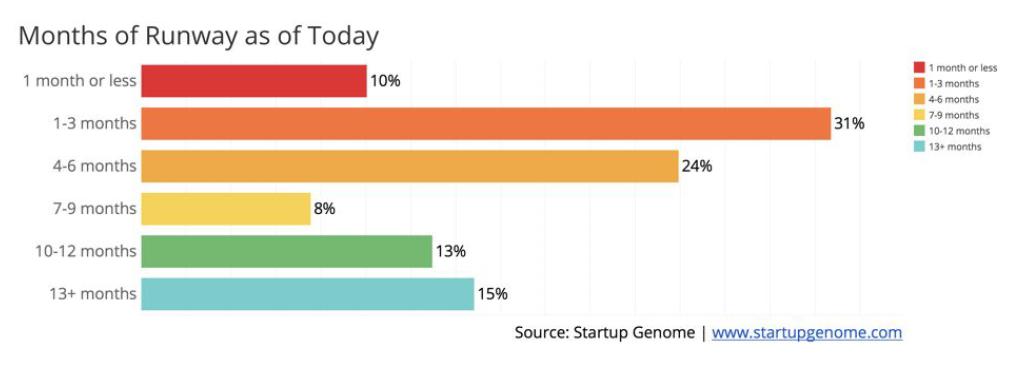The onset and spread of COVID-19 have left few people, if any, unaffected. Governments the world over have been repeatedly tested and stretched. They have set new rules and norms to try to re-establish confidence and give economies a chance of survival.
How do I follow the Pioneers of Change Summit?
We have a rare and narrowing window of change to build a better world after the pandemic.
The World Economic Forum's inaugural Pioneers of Change meeting will bring together leaders of emerging businesses, social entrepreneurs and other innovators to discuss how to spark and scale up meaningful change.
To follow the Summit as an individual, you can become a digital subscriber here. As a company, you can participate in the summit by becoming a member of our New Champions Community.
Less noticed and discussed, however, is the impact of the pandemic on entrepreneurial businesses. As sources of finance dry up, more than 40% of new ventures will fall into the so-called “red zone” with only enough cash for three months or less of normal operations.
Since the beginning of the crisis, more than 70% of start-ups have had to terminate contracts of full-time employees.
Yet, while a large number of start-ups have suffered during the pandemic, COVID-19 has also led to an increase in entrepreneurial activity. Companies and individuals across the world have rallied to respond to, and where possible, tackle this crisis. From organizers of music festivals overseeing pop-up morgues to automotive companies pivoting manufacturing to much-needed ventilators, there has been a surge in creativity. People and companies have devised new ideas to respond to existing or emerging needs insufficiently addressed by governments and incumbent institutions.
The picture of how entrepreneurs and their systems have been affected is more nuanced than we might, at first, believe, but understanding it is important: how it’s being (re)shaped today will have long-lasting effects.
Government support targeting high-growth start-ups
During times of crisis, government support of industry has always been essential. Think back to Franklin D Roosevelt’s response to the great depression, rolling out the new deal and spending to get America back on its feet. The furlough schemes in the UK and effective implementation of a basic income scheme in the US are modern examples.
Have you read?
During the COVID-19 crisis, governments around the world have taken action to support local ecosystems. The UK government launched a £1.25 billion rescue package to help start-ups, emphasizing support for “firms driving innovation”, “the unicorns of tomorrow” and “the technology success stories of the future”.

Yet while these innovative start-ups are undoubtedly essential for the future of innovation and supporting them is critical, the current COVID-19 crisis also shows the importance of small businesses with more incremental approaches to innovation. To fully understand how the entrepreneurial landscape is changing, we must explore these other types of entrepreneurial activity as well.
Finding opportunities amid the crisis: agility is crucial
Some new-born entrepreneurs and start-ups have been more opportunistic during the pandemic, pivoting their businesses through some kind of “repurposing” and redirecting existing knowledge, skills, people and networks to new needs that have emerged. From start-ups and individuals producing and selling face masks and shields to their local communities to local taxi start-ups turning into grocery delivery companies, the nature of innovation is often incremental but, at the same time, essential for survival and adapting to our “new normal”.
A repurposing approach is not without its challenges. Many of these entrepreneurs come from different knowledge domains and this poses a problem for those wanting to do business with them: how can they judge their trustworthiness or legitimacy without a past reputation in that domain?
While most start-ups may see repurposing as a short-term opportunity or solution, it remains a fundamental survival strategy and growth opportunity for the economies and industries of countries. As such, to take advantage of the potential of these entrepreneurs, governments and other supporting institutions must develop appropriate measures to support this kind of entrepreneurship. For instance, public procurement could help start-ups gain market access and be a useful vehicle for building reputation so these ventures are seen as legitimate business partners.
Changing perspectives on entrepreneurship
It is almost certain that the way entrepreneurial businesses are affected today will have an impact on how entrepreneurship is perceived as a job choice in the future.
The changes we observe today may be a double-edged sword. Some might argue that the crisis could negatively impact the risks associated with entrepreneurship, and ultimately hinder start-ups in attracting the right talent; others might suggest that the changes we observe today could alter perceptions of entrepreneurship for the better.
In recent years, entrepreneurship has become more and more associated with stereotypical high-tech start-ups and entrepreneurs, often based in certain geographical areas and fertile environments across the world. Although the successes of these young companies are undoubtedly essential for the advancement of our societies, some might argue that entrepreneurship has become a game for the happy few, for those with access to the right type of education, funding and networks.
What we see today is the potential for democratizing entrepreneurship and creating new entrepreneurial role models that people can more easily identify with. This could ultimately lower the threshold of entrepreneurship for many and stimulate people to start their own businesses.
With so many large institutions shedding talented and well-qualified employees, perhaps this crisis and its aftermath will encourage more people to take on the risks associated with entrepreneurialism when they think they’ve identified or discovered an opportunity. There are so many new needs and gaps to fill and start-ups tend to be much faster at adapting and filling gaps than more established companies
What is the World Economic Forum doing to manage emerging risks from COVID-19?
The first global pandemic in more than 100 years, COVID-19 has spread throughout the world at an unprecedented speed. At the time of writing, 4.5 million cases have been confirmed and more than 300,000 people have died due to the virus.
As countries seek to recover, some of the more long-term economic, business, environmental, societal and technological challenges and opportunities are just beginning to become visible.
To help all stakeholders – communities, governments, businesses and individuals understand the emerging risks and follow-on effects generated by the impact of the coronavirus pandemic, the World Economic Forum, in collaboration with Marsh and McLennan and Zurich Insurance Group, has launched its COVID-19 Risks Outlook: A Preliminary Mapping and its Implications - a companion for decision-makers, building on the Forum’s annual Global Risks Report.
Companies are invited to join the Forum’s work to help manage the identified emerging risks of COVID-19 across industries to shape a better future. Read the full COVID-19 Risks Outlook: A Preliminary Mapping and its Implications report here, and our impact story with further information.
While many start-ups will fail to survive the crisis, the pandemic has also given rise to more or new entrepreneurial activity – a reminder for us to reconsider how we value innovation in entrepreneurial systems.
The question we are faced with today is how this will influence us going forward and what can be done by different players to make sure we move in the right direction.
How will the experiences of the thousands of entrepreneurs who will lose their jobs during the pandemic impact the perception of entrepreneurship? Will the decades of efforts made to enhance the entrepreneurial environment and diversify our economies through government and private funding and education be undermined? Or is it simply the shake-up needed to restructure the system?




